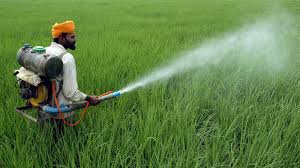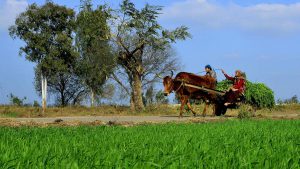
New Delhi: Pesticide manufacturers have threatened to take the government to court if it goes through with banning the manufacturing and export of 27 pesticides in India.
The Ministry of Agriculture had issued a draft notification on 14 May, intending to ban the chemicals for being harmful to humans and animals, many of them are widely used by Indian farmers. In the notification, the ministry had given all stakeholders time till 27 June to submit their objections and suggestions.
In a digital press conference Tuesday, President of the Pesticides Manufacturers and Formulators Association of India (PMFAI) Pradip Dave declared that the ban will shrink India’s export capability by more than 50 per cent and will also hand over a Rs 12,000 crore market to China.
The pesticide manufacturers also alleged that the ban will not only lead to a dip in export earnings for the Indian industry but will also create a massive setback for Indian farmers amid the Covid-19 crisis and the upcoming kharif crop season.
According to them, banning the pesticide will lead to an additional burden on farmers as the 27 pesticides cost Rs 350-450 per litre while the alternatives are imported and cost Rs 1,200-2,000 per litre.
Samir Dave, director of Aimco Pesticides Ltd and President of Agrocare, a Belgium-based global association for the agrochemical industry, said, “The pesticides under the ambit of the proposed ban produce more than 130 formulations used by the farmers for crop protection. This ban will increase farm input cost of farmers who are affected by lockdown to contain the spread of locust, apart from various other threats to their crops.
“These pesticides account for 40 percent of the domestic market and the alternative available to the farmers will be branded, readymade and expensive ones produced by the MNCs,” added Dave.
Chemicals are hazardous and harmful: Govt
The draft notification, titled ‘Banning of Insecticides Order 2020’, prohibits the import, manufacture, sale, transport, distribution and use of 27 pesticides, including Acephate, Atrazine, Benfuracarb, Butachlor, Captan, Carbofuran, Chlorpyriphos, 2,4-D, Deltamethrin and others. It also proposes to ban the chemical Malathion that was used extensively by the government during the recent locust attack.
According to an official of the Ministry of Agriculture, “Out of the 27 pesticides which are proposed to be banned three are Monocrotophos, Methomyl and Carbofuran which are associated with high levels of toxicity leading to even farmers’ deaths.”
“They have also been declared as extremely hazardous or highly hazardous by the World Health Organization (WHO),” he told ThePrint.
“Apart from the three pesticides banned by WHO, other pesticides are categorised as extremely harmful by the European Union.” added the official.
This notification has, however, brought two union ministries at loggerheads with each other, with the Ministry of Chemicals and Fertilizers opposing it.
On 2 June, Secretary of the chemical ministry R.K. Chaturvedi, in a letter to Agriculture Secretary Sanjay Agarwal, stated that the ban on pesticides will not be the correct move at this moment.
Chaturvedi cited representation from PMFAI, FICCI and other stakeholders in the pesticide industry, and noted that generic pesticides constituted 40 per cent of the domestic pesticide market and the ban would adversely affect export to countries like the US and China, while increasing the burden on farmers due to the steep prices of the alternatives.
The letter also questioned the timing of banning the 27 generic pesticides. According to Chaturvedi, the pesticides were registered under the Insecticides Act, 1968 and have been used in the country since 1970 without any risk or adverse impact to human and animal lives or the environment.
The Anupam Verma Committee report
The pesticide manufacturers also labelled the Anupam Verma Committee report, responsible for the proposed ban, as arbitrary and alleged that it did not consider all the evidence and data available on pesticides.
The committee was constituted by the agriculture ministry in August 2013 to review 66 pesticides. These pesticides have been barred or restricted for use in farming in other countries. The committee recommended a ban on 13 ‘extremely hazardous’ pesticides, phasing out of six ‘moderately hazardous’ ones by 2020, and a review of 27 chemicals in 2018.
It is this list of 27 pesticides, which were meant to be reviewed in 2018, that have been banned by the Ministry of Agriculture now.
The report had been called into question by the PMFAI in the past as well. They accused the committee of reviewing the pesticides in just five meetings, without input from anyone involved in the industry. Furthermore, even after six years, the report has not been made public and the pesticide manufacturers asked the government to appoint a scientific committee to review the report.
The committee was led by Anupam Verma, a retired professor from the Indian Agriculture Research Institute (IARI). He is currently the President of the World Society for Virology and was the former president of the Indian Virological Society.
In the press conference, the PMFAI also alleged that the ban was a conspiracy of importers and foreign companies with bureaucrats to replace the generic pesticides with imported and expensive readymade products.They alleged that this will wipe out the Indian-manufactured generic pesticides and the raw material chain of the related chemical industry.
According to the manufacturers, the pesticide market in India is worth over Rs 40,000 crores, out of which chemicals worth Rs 22,000 crores are exported to global markets by Indian companies including the US and Europe.
The generic pesticides proposed to be banned account for 40 per cent of the domestic market and 50 per cent of all exports from India, stated the manufacturers. If the 27 pesticides are banned in India, the entire export market of these products worth Rs 12,000 crores will go to China, which is the main competitor of India in the global market.




